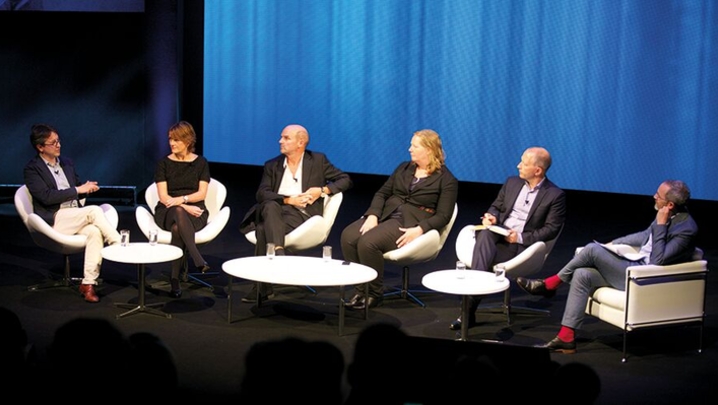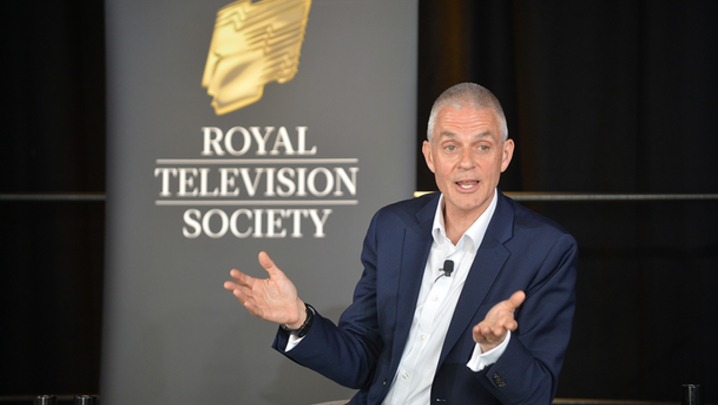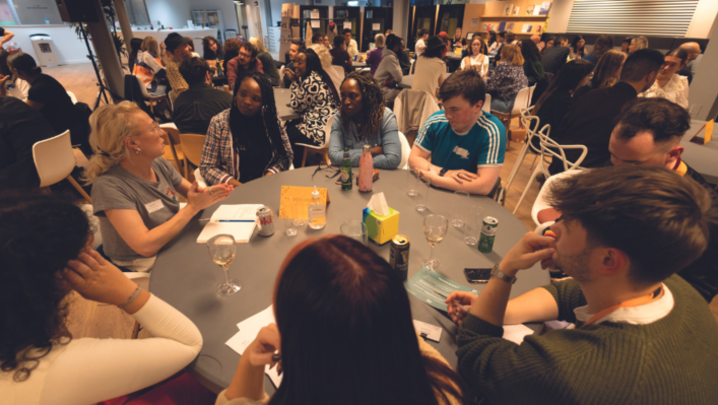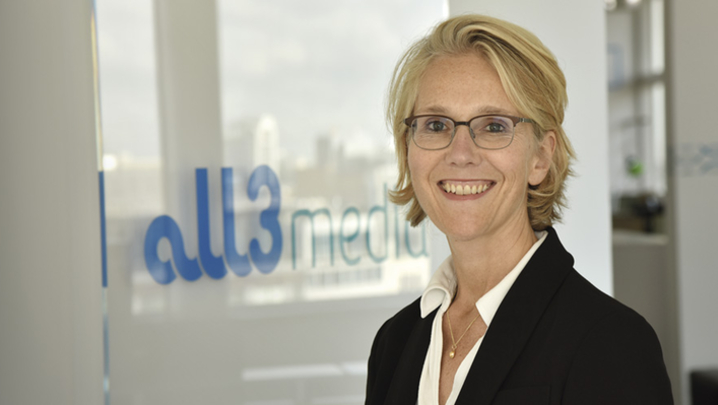Anne McElvoy turns the spotlight on Stephen Lambert, whose reality formats, such as Wife Swap and Gogglebox, have changed television
Stephen Lambert looks a bit like Lenin – bald, with steely blue eyes and a bit unyielding. He can claim to be the man who revolutionised factual television, bringing us so many of the formats that dominate the schedules, from Wife Swap, The Secret Millionaire and Undercover Boss to Faking It.
His most recent hit is Gogglebox, the Channel 4 offering that united David Cameron and Nick Clegg in admiration, when asked during the election campaign which shows they enjoyed.
I visit Lambert in his eyrie in Soho. His company, Studio Lambert, occupies most of a sparely furnished set of offices. A – mainly – young workforce are clamped in headphones or intently bashing out scripts.
I ask what happens on all the other floors. "The same: making programmes," says Lambert, drily. The factory-like production belies the range of work that often takes him to Los Angeles, where he is Chair of All3Media America, (All3Media owns Studio Lambert). As the Studio's CEO, he has the final word on the casting of global formats.
Now he is heading a new push into drama in the British and American market, having just hired the senior BBC drama executive Sue Hogg to spearhead the charge.
His biggest brands have different lives in various countries. Four in a Bed, a show about bed and breakfast owners swapping billets, while modestly impactful on Channel 4 daytime, is "absolutely huge in France – it seems to connect very powerfully to the way people see themselves".
What people call ‘populist rubbish’ is just about the hardest thing to make
The Secret Millionaire thrived best in the US "because you had an amazingly deep pool of people to fish from".
Scathing about critics who think that those natty formats are an easy way to make television, he says:"What people call 'populist rubbish' is just about the hardest thing to make. It's a million times easier to make some obscure documentary than to make something really good and accessible that will hold people's attention over many episodes."
One of his best-known shows, Wife Swap, was originally dreamt up by his wife, the journalist Jenni Russell. But it took "a lot of finessing – because people had to be very familiar with the ground rules for it to work smoothly. You have to be absolutely clear what the proposition is."
The resulting formats seem to be in the grip of the 21st-century equivalent of a medieval guild of trusted producers and developers, selecting and shaping which bits of "normal" life we see.
Ideas that thrive on the appearance of us dropping into people's lives are, as he puts it, "the authored interpretation of life", because they are edited, with judgements made throughout the production process.
Ought we to be worried about the decline of the kind of documentary that Lambert was able to make as a programme-maker at BBC Two's Modern Times? AA Gill, The Sunday Times's acerbic TV critic, believes that a vein of mockery underlies the format variety.
"There's a very questionable notion of the audience being left to entertain itself,' he says. "Gogglebox is a parody of The Royle Family, but The Royle Family was brilliantly shot and written.
"The sum total of us watching people who are a bit odd, or clashes of class or culture isn't really that enriching or empathetic."
But Lambert can plead a documentary pedigree that precedes his lucrative formats. He made documentaries for several years until the mid-1990s, ending up as Editor of the award-winning Modern Times. And he was one of the high-flyers who left Auntie to set up an independent.
A culture of "managing up" (key decisions being made higher and higher up the management chain) prompted him to move on. "It infuriated me and I still think it is wrong that single commissioning editors are deciding so much of what goes on air. You end up reflecting the taste of a handful of people."
The BBC licence fee is, he thinks, "fine in principle, but I don't think it can last in its present form and the BBC will need to get its head around that".
"It is ethically difficult, when there is so much competition around, to compel people to pay for the licence fee for services they may not want to use," he muses. "That argument is getting harder to make. You come back to the element of compulsion, which sits badly in a world where people want to exercise choice. If the service is so wonderful, why not give people the choice to pay for it?"
His solution sounds like a lean, core BBC service of news and some current-affairs output, with all other production commissioned from the independent sector (not surprisingly, perhaps, for an indie king).
"I don't understand," he says, "why we need BBC Entertainment (which makes, inter alia, Strictly Come Dancing) or a BBC in-house drama or in-house factual department. The BBC is bombarded with ideas from companies who have proved over many years that they can make great programmes.
"It would be a much better service to the viewers for the BBC to focus on commissioning the best of all that than to be fussing about their provenance and quotas."
So, does he warm to the idea of BBC Studios, the brainchild of Director-General Tony Hall, to allow BBC production to compete in a wider market place? Not very much.
"The purpose of it is very unclear to me," he says. "Is it in the market like anything else? And if it is selling to other broadcasters, what are the criteria to avoid it being just a state-aided intervention in the market, but with the licence fee giving the BBC an advantage? That doesn't sound sustainable."
Lambert's CV may suggest a career of one success topping another, but there have been setbacks. He looks far from thrilled when I mention "Crowngate", a pratfall he experienced when he was head of RDF, his first independent production company, in 2007.
The escapade resulted in him leaving the company and Peter Fincham resigning from his controller's job at BBC One. It's still a bit mysterious, trying to work out how a trailer for the documentary A Year with the Queen ended up apparently showing the monarch flouncing out of the room in a huff.
I ask Lambert what he learned from the incident. "Pay attention to everything and don't send out bits of tape you didn't mean to." He adds, with a mixture of defensiveness and humour, that "lots of trailers are wrong".
A few years on, he had a miss with the Notting Hill-based docusoap Seven Days, but, he reflects, that helped the company to finesse Gogglebox.
A much-anticipated Million Second Quiz in the US, intended to lure viewers to play along in real time on phones and tablets with the contestants, didn't thrive on NBC. He admits that the digital age holy grail of combining consumer technology with formats remains elusive.
A friend notes that the format meister is "a walking contradiction" – the "£20m man" who still "works as hard as if he's just set up his first company out of a cardboard box".
He won't confirm that the figure represents his worth, but doesn't deny it. A favourite pastime suggests that he's not doing badly: he sailed with friends across the Atlantic to the Caribbean last year in his yacht.
"One is very lucky," he says with a rare blush. "I wouldn't want to stop working and just sail around, though."
Anne McElvoy is Public Policy and Education Editor at The Economist






